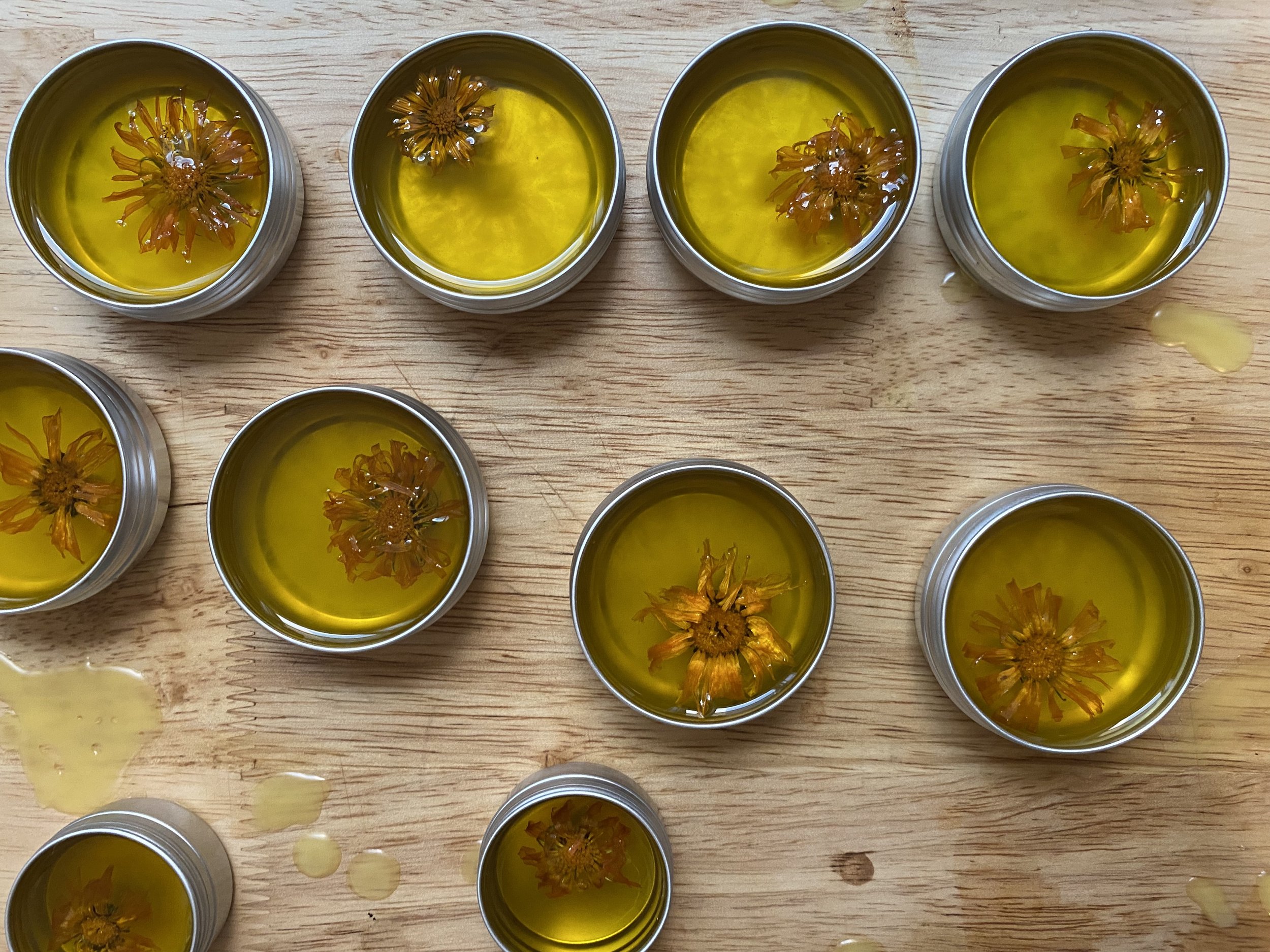Toward waste consciousness and circular systems
Dirt & Free Herbal Arts uses compostable, reusable, and recycled materials to promote circular systems instead of just adding to landfill. Sounds great on the surface — but what does it really mean?
“Compostable”
Above: an empty pouch of soft touch herbal tea, cut up for the compost bin
Compost is the nutrient rich end to organic matter like plants and food waste, aided by mycelium, insects, heat, and time.
Dirt & Free Herbal Arts tea pouches and all labels are 100% compostable! This means if you do industrial composting through a service like CompostNow, the pouches and labels will break all the way down and support vibrant soil health. The packaging is also safe for home composting, but will be extra slow to transform. To help move the process along, you can cut your tea pouches into smaller pieces.
“Reusable”
Above: just-poured tins of salve with calendula flowers floating in the center
Glass bottles, salve tins, and glass jars are reusable and have many great purposes, but first they need to be properly cleaned.
To clean tincture and syrup bottles and jars, separate the plastic parts from the glass. Wash everything with soap and warm water ideally as soon as possible - soak in hot water if needed. A tiny brush or qtip can help to get residue in the glass dropper bulb. Rubbing alcohol is magic for removing extra sticky labels from bottles. Let everything air dry completely and re-assemble, or go a step further and sanitize the bottles. To sanitize glass bottles, you can boil them for 20 minutes or bake them for 20 minutes at 250 degrees.
To clean tins, first use a napkin to wipe off as much salve as you can. Then wash with warm or hot soapy water to encourage the oils to liquefy and let air dry completely before re-assembling.
Shipping materials are also reusable! Why buy another box?
Is there plastic in your herbalism? I’m here to tell you it’s okay.
But if we’re going to use plastic in our work and daily lives the least we can do is keep it in circulation as long as possible. Wash it, reuse it, repurpose it. Retrain yourself to see upcycled objects like shipping materials as creative ways to divert plastic from landfill.
“Recycled”
When I buy new shipping materials, I look for recycled! My brown mailers are 100% recycled.
Why a focus on “recycled” and not “recyclable?”
Technically, the recyclable materials I send out are glass and cardboard; and with glass and cardboard, always reuse before recycling. It takes a lot of money and energy to scrub and sort recyclables.
Plastic is the hardest and most expensive to process, making it nearly impossible to recycle. I don’t know who needs this reminder but plastic recycling is a marketing scam funded by big oil to trick people into buying more plastic and securing a bright future for oil industry executives. And by the way, ♻️ this symbol ♻️ is required on hard plastics as part of the great oil marketing scam (plastic is made from oil), and means NOTHING for most plastics! Over 90% of the plastic you throw in the blue bin goes to landfill, contributing to environmental degradation and toxicity for POC and rural communities.
So when we keep materials in circulation, we conserve energy, and we get creative with what we have.
It shouldn’t be on the individual to eliminate toxic waste from our environment, but alternative systems already exist! Buy nothing groups, really really free stores, eco-bricks, love fridges, and composting are all part of those systems that help us honor the earth’s gifts.
Above: a stack of shipping materials
A lesson learned
Read the fine print — including when there’s no fine print at all. In 2023-2024 I hosted a community workshop series with Freedom Fighter Herbs to distribute herbal remedies, and we purchased a thousand or so kraft pouches from ULINE. I couldn’t find any information about how to dispose of the pouches, and I assumed since they were “kraft” they would be compostable or recyclable. NOPE! In the end I’m glad I got them because they still come in handy for the herb exchange (most of the orders I receive are BIPOC folks getting free herbs, which Patrons help me to do, hell yeah!).
If you made it here, thanks for reading through. Waste is complicated, and it’s challenging to hold a business in a circular way.
For now I’m opting to be transparent about where I’m at with it rather than pretending my methods are perfect or ideal. With every earth day I’m working toward a more waste-conscious and circular practice. And I want folks who choose to order from me to know that waste consciousness is an option! To be ecologically minded in this consumerist society we'll need to do things like clean and sort materials at their end of life — better yet make it interesting and find ways to keep the medicine going.
We’ll practice together 🌎
Join me on Patreon
Become a member on Patreon and join kitchen/community herbalism classes, learn ethical foraging, and support my practice. Membership is offered by tiered pricing. Join for free to get on the email list for blog posts and monthly invitations right to your inbox!



